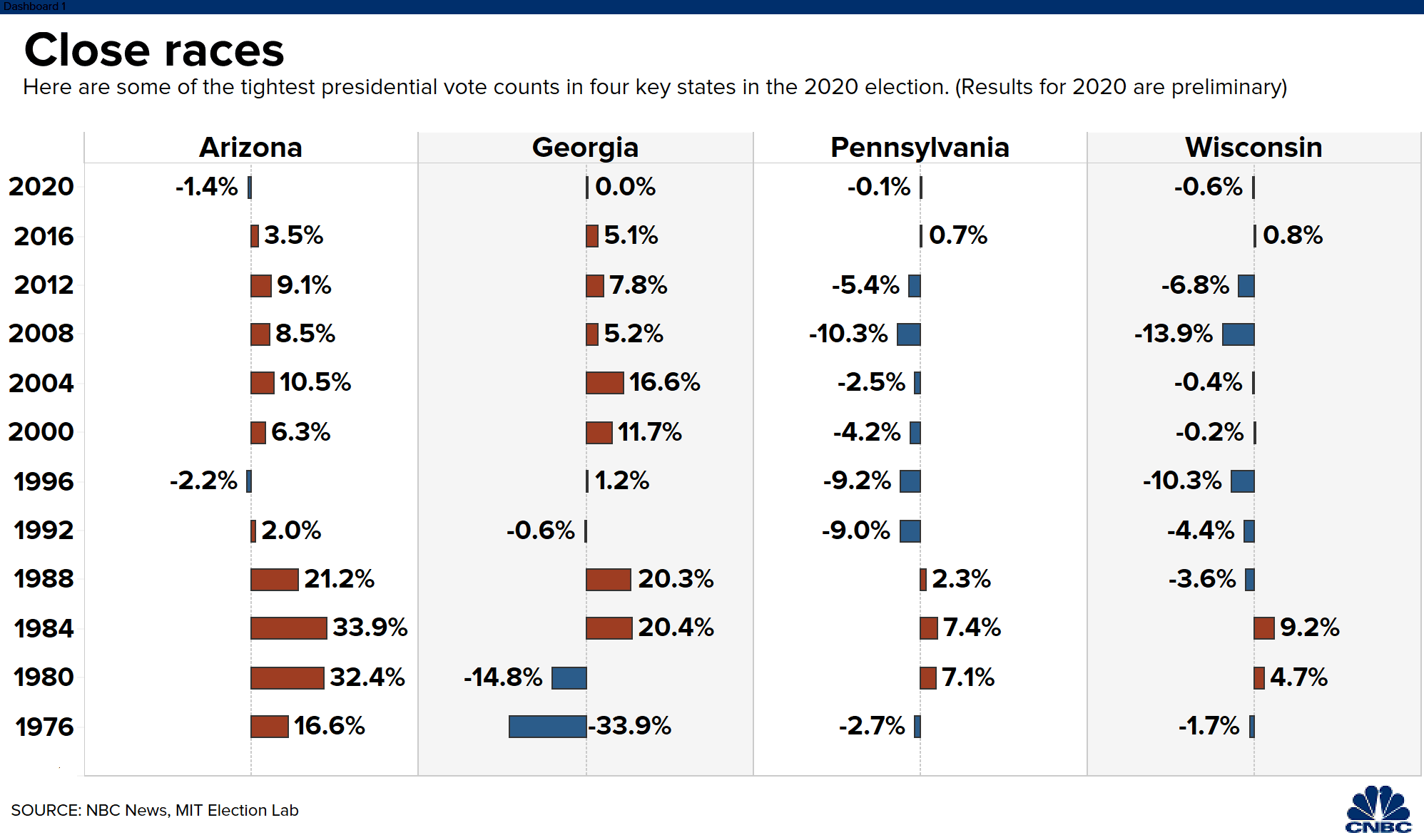These states could go to a recount in the 2020 election, and here’s how it will work

Election workers count ballots at the Maricopa County Tabulation and Election Center (MCTEC), in Phoenix, Arizona, November 6, 2020.
Jim Urquhart | Reuters
While election results from key swing are still trickling in, Democratic nominee Joe Biden on Friday appeared to be inching closer to victory in the 2020 presidential race. But President Donald Trump‘s campaign has already vowed to seek a recount in at least one battleground state, and more states could launch recounts if the races are competitive enough.
The Trump campaign has called for a recount in Wisconsin, where NBC News has Biden projected to win, and election officials in Georgia, where Biden has a narrow lead, have said a recount is expected.
Requests for recounts could also be filed in other states, such as Arizona, where Biden currently holds a slim lead, and possibly even Pennsylvania, a must-win battleground for Trump.
With races still too close to call in a handful of states, the former vice president holds 253 electoral votes, NBC News’ projections show. He needs just 17 more votes to win the election, and has multiple paths available to reach that threshold. Trump, on the other hand, trails Biden with 214 votes and would need to pick up most of the remaining states to win, according to NBC.
Recounts can only be initiated under certain circumstances, and the rules vary from state to state. Regardless of how they’re conducted, recounts rarely change the outcome of a race: Only three statewide general elections have been reversed after a recount since 2000, according to a report from FairVote that looked at 5,778 such races.
“Statewide recounts almost never overturn more than a few hundred votes,” said Ken Kollman, professor of political science at the University of Michigan.
If recounts do occur, “I’m very skeptical” that they will change any results, Kollman said.
By their nature, recounts can also be fraught with controversy — especially when one campaign is launching allegations of voter fraud and filing lawsuits that could affect the counting process.
Trump and his campaign surrogates have claimed, without providing evidence, that various forms of electoral fraud have been committed in numerous states. The campaign has filed lawsuits to temporarily halt vote-counting in multiple states, including Pennsylvania and Michigan. Some of them have already been dismissed.
“I can’t think of any situation where a major presidential candidate has behaved in this way,” Kollman said. “It’s a dangerous strategy and a damaging strategy for our civic culture.”
Here are the rules for recounts in the most competitive states of the presidential election:
Georgia
Biden overtook Trump’s lead in the Peach State early Friday morning, and currently holds a slight edge of fewer than 1,600 ballots, with 99% of the expected vote already counted, according to NBC.
Georgia’s Secretary of State Brad Raffensperger, a Republican, said Friday that “with a margin that small, there will be a recount in Georgia.”
While a razor-thin race in Georgia cannot trigger an automatic recount, the losing candidate is allowed to request a recount if they lost an election by less than 0.5% of the total votes. That request can only be made to the secretary of state within two business days after the election results are certified, which must be done by Nov. 20.
The secretary of state can also order a recount of ballots if he or she believes that errors have been made.
Wisconsin
Biden was projected on Wednesday to win Wisconsin’s 10 electoral votes, according to NBC. On Friday, with 99% of Wisconsin’s expected vote in, Biden led Trump by more than 20,000 votes.
Nevertheless, Trump campaign manager Bill Stepien said that the president plans to request a formal recount.
“The President is well within the threshold to request a recount and we will immediately do so,” Stepien said in a statement Wednesday, before NBC had made its call for Biden.
Under Wisconsin law, an “aggrieved” candidate can request a recount if they received within 1% of the winner’s vote total. The loser can file a petition for a recount no later than 5 p.m. on the first business day after the state election commission has received final results from all counties. Those counties have until Nov. 17 to hand in their final tallies.
The Trump campaign would also have to pay the state for the cost of conducting the recount. It could total millions of dollars.
Pennsylvania
Pennsylvania’s secretary of state, Democrat Kathy Boockvar, must order a recount if there’s a difference of 0.5% or less between the winner and the loser.
A recount can also be triggered if at least three voters in each county allege errors or discrepancies in the count.
The Trump campaign, including the president, have zeroed in on the Keystone State, filing multiple lawsuits related to the ballot-counting process and issuing sweeping allegations of fraud without providing evidence.
Pennsylvania has 20 electoral votes. On Friday afternoon, Biden was ahead of Trump by more than 14,000 votes, with additional batches expected to favor him as they come in.
If Biden wins Pennsylvania, he wins the presidency.
Arizona
A recount is required in Arizona when the margin between two candidates is within 0.1% of the total number of votes cast.
Trump on Friday afternoon was well outside of that range, having gained 48.6% of the vote compared with 49.9% of the state for Biden, according to NBC.
But Biden’s lead has been slowly shrinking in the state, and the Trump campaign has maintained that they expect the president will come out on top.




